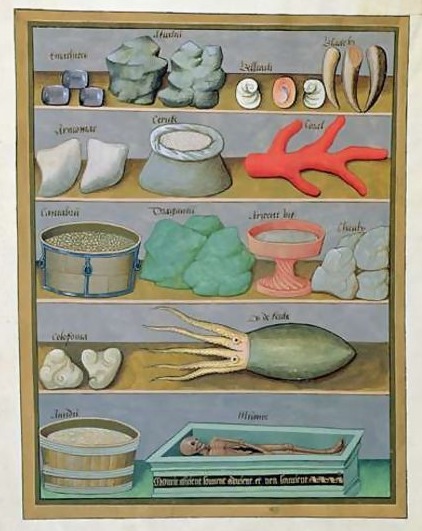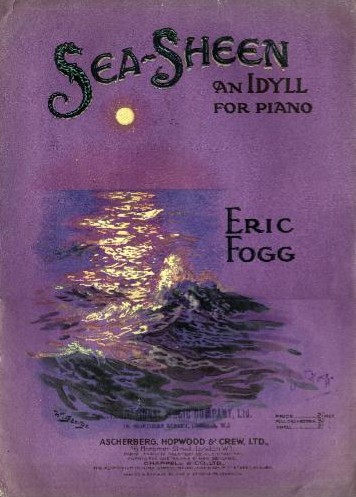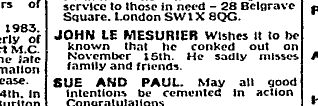Jorge Luis Borges’ tenure as a blind inspector of poultry, while brief, was not without precedent. We recall the case of Pimty, two decades earlier and far, far from Buenos Aires. It may be an exaggeration to dub him, as did Pebblehead in the title of his bestselling paperback biography, The Illustrious Pimty, but that there was a lustre about him cannot be denied, unless you want to start a punch-up. Pimty’s blindness was more Blunketty than Miltonic, he was the sort of man who enraged cows, when he trespassed in their fields, at weekends, carrying a picnic basket, under a thunderous sky, escaping the poultry market with its tin roofs and yelling merchants, his prison in the week, the inspector’s hut, the braille calendar hanging tattered from a nail and the nail rusted, pricking him if he wasn’t careful, blood on his fingers as his hands fumbled delving into a hen’s croup, prodding, inspecting, as he was paid to do, oh and more than generously, he got a fair whack, and he spent it on booze and floozies, they haunted the poultry market, like figures from an early Kirchner, gaudy, angular, themselves sozzled on bathtub gin, sometimes they clucked just like the hens, particularly in the early afternoon, poor Pimty fuddled but up to his duty, tape measure round his neck like a tailor shifting schmutter, god knows why, it wasn’t his job to measure the hens, nor their eggs, they joked he thought it was some kind of loose cravat, as if being blind he wouldn’t know, they should have learned from their failed tricks, those mischievous poulterers, shoving a ball of dough stuck with feathers on the inspector’s table, his rage was as terrible as the cows when he opened the gate of the field with one hand, holding tight to the picnic basket with the other, out in the mist, oblivious of it, but not of the cows that bore down on him, on Saturdays and Sundays when the poultry market was closed, shuttered, a deserted patch of concrete and cement, stray feathers scattered, neglected by the janitor’s broom, the janitor Pimty’s pal, some said his half-brother, deaf as a post where the inspector was blind, they made quite a pair even without the blood tie, always playing card games at lunchtime, rummy and spite and my lady’s bonnet and Croesus, no money ever changing hands, the table rickety, sawdust everywhere, the stove in the corner, rain on the roof, birds pecking grain from the floor, shadow in the hut door of the inspector of inspectors looming, come for the rent and a check up, Pimty defiant, spitting out his words, hair standing on end as if he’d seen a ghost, half these hens are sick, man, what do you expect me to do, have a tot of gin while you tally my ledgers, I have to go and have a word with a man about a Buff Orpington and a Dutch Hookbill, and off Pimty goes, weaving across the familiar yard, sniffing the air, a storm brewing, better put on his sou’wester, yellow as a duck in a nursery book, shiny cardboard pages, stiff, buckled here and there, as you’d expect, he remembered gazing and gazing, rapt, when still so tiny with eyes that worked, before the operation, the surgeon cutting the useless withered nerves and then the blur black, the new life, the hard study, the Poultry Inspection Board, such an easy examination, what’s this, what’s that, this is this sir and that is that sir and a badge for merit, he still wears it, polishes it and buffs it, daily, after breakfast, kippers or bloaters, Schoenberg cassette, Transfigured Night, day too, thinks Pimty, day too, transfigured and transformed, weekday poultry market and weekend picnic, when he gets out, humming as he approaches the gate in the field, beyond which angry cows await him, and he pacifies them, sweet nothings, try the same thing on the hens and there would be mayhem, that much he discovered, one awful Thursday, it was raining then too, and he slipped on straw or grease and gashed his leg, you won’t find a better tourniquet than a tape measure, believe you me, still there was much blood spilled before it was taut, Pimty’s gore, like a rare expensive wine, metallic bouquet, and something in it irresistible to ducks, dozens of them falling upon it like starvelings, splashing about in his blood, the inspector deafened by clucking, thinking I better find out exactly what it is that’s in my veins, I may be a miracle of medical science, who’d have thought, hens maddened by the blood-splattered ducks, shrieking tangles, add in the sirens from the emergency services and you have complete havoc, but Pimty back at the poultry market next morning, behind his table, sticking his fingers up a duck’s fundament, the sense of touch unerring, even through the rubber glove, bright yellow like the rainhat, like the ducks in the nursery book, so much yellow, it was Pierre Bonnard who said you can never have enough yellow, no more yellow for Pimty but the yellow in his brain, remembered yellow, bright enough when he strains the synapses, you can almost hear them ping and twang, if you listen carefully, and Pimty does, he’s all ears, that’s why he hears the enraged cows in the field even before they are enraged, before his thumb clicks open the gate, on picnic days, in sunshine or mist, or once, when his watch stopped, in the middle of the night, high wind, cattle in slumber, owls hooting, Pimty with his rug and hamper, jam sandwiches, fishpaste, cocoa, a drowned beetle in the flask, the janitor never joins him, Greb the janitor, he goes instead on organised picnics for the hard of hearing, to the grounds of castles and stately homes, not cow-strewn fields, always in daylight, light Pimty doesn’t see and hasn’t seen for years, though he senses it on his eternally closed lids, heat and cold, damp and haze, he no longer bothers with the sunglasses he used to sport, frames too heavy on the nose, he smashed them underfoot in a temper, drunk to hell at the time, swigging as he smashed, at the poultry market but off duty, on a Tuesday afternoon, with a floozie on his arm, giggling, egging him on, a bit batty if truth be told, or dotty, that’s the word, fond of the poultry, too fond maybe, in an unseemly way, kept trying to abduct a hen or a duck or a goose, take it home as a pet, oh go on Pimty nobody will miss it, I can call it Flopsy or Clytemnestra and make a pond for it in my bathtub, feed it grain or whatever it eats, I know a grain supplier, a man with a silo, oh pretty please, but for all he was drawn to grandiose debauch Pimty was as conscientious a poultry inspector as the market ever had, and he foiled her kidnaps, every one of them, using his lustre, really quite mysterious, but absolutely effective, going by results, the inspector of inspectors always had a good word for him, back at headquarters, that man Pimty is a bloody marvel, never a day goes by that his poultry inspections aren’t a masterclass in the art, even when he’s sozzled, there is a lustre about him that makes my jaw drop, Pimty never heard any of this, they never invited him to HQ, not even to the cocktail parties, a stuffy bunch, and him shall we say difficult, haphazard in certain settings, liable to break things, jugs, plates, toasters, he was a devil with toasters, rarely invited anywhere, hence the lonely picnics, Pimty in a field beneath the enormous sky, placating angry cows, sprawled on his rug, away from the poultry, maybe that was when he worked at his lustre, it was as if he emitted rays, no, a sheen, unearthly, when he chose to switch it on, which he certainly did when Pebblehead came calling, he’d heard rumours, bustled into the poultry market first thing Monday morning, in cape and spats, entourage of bodyguards, so where’s this blind inspector I’ve been hearing about, tell me dammit, I have a paperback to write, ah good day to you sir, gosh, Pebblehead dumbstruck, slumps in a chair, an assistant takes notes, Pimty all the while inspecting geese and hens and ducks, even a swan, mute, he doubles up on rubber gloves, uses some sort of beam, strange miniature torch, works its controls so so deftly, but the swan is dead, they prosecute the merchant, huge pile of legal papers, even bigger pile of braille for Pimty, big thick sheets, untold thousands of dots, he knows the whole thing backwards, fantastic witness, visits the swan killer in prison, dank cell, no smoking, repent, repent, but we can never have you back at the poultry market, you crossed a line and I drew that line, yes, and it’s indelible, like all my lines, wherever I draw them, he’s babbling, Pimty, making it up as he goes along, to strike the fear of god into the convict, before he’s shipped away, over the sea, to a penal colony, one specially built for bird-killers, rocky and remote, blasted by gales, screeching gulls, auks, guillemots, sky cold and grey and hopeless, place of penitence, prising barnacles from stone for food, all in Pimty’s mind, vengeful, eaten away with hatred, teeming visions, the hen in the brain, oh yes, lustrous, Pebblehead saw that, but he had no idea of Pimty in the round, the whole man, duck messiah, goose god. It is certainly worth reading the biography, soon to be a film, but much of what Pebblehead writes is nonsense. For one thing, Pimty looked absolutely nothing like Anthony Burgess.



